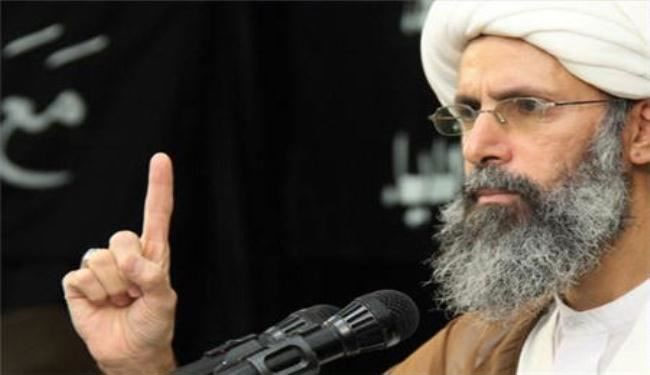PHOTO: Sheikh Nimr Baqr al-Nimr, arrested in 2012 and executed on Saturday
UPDATE, JANUARY 4: The family of executed cleric Sheikh Nimr Baqr al-Nimr have issued a statement calling for restraint amongst followers.
The statement on Saturday night emphasized that al-Nimr was a “model for the peaceful demands movement” and rejected sectarianism. It called on protesters to “have self-control” and follow al-Nimr “by continuing to demand their rights peacefully”.
Mohammed al-Nimr, al-Nimr’s brother, said earlier in the day, “We hope that any reactions would be confined to a peaceful framework. Enough bloodshed.”
The statements came as demonstrators in Iran’s capital Tehran attacked the Saudi Embassy, burning and ransacking an annex.
See Iran Daily, Jan 3: Saudi Embassy Attacked After Cleric’s Execution
The US State Department issued a cautious statement that did not condemn the execution:
We have previously expressed our concerns about the legal process in Saudi Arabia and have frequently raised these concerns at high levels of the Saudi Government. We reaffirm our calls on the Government of Saudi Arabia to respect and protect human rights, and to ensure fair and transparent judicial proceedings in all cases.
The United States also urges the Government of Saudi Arabia to permit peaceful expression of dissent and to work together with all community leaders to defuse tensions in the wake of these executions.
The Department also said was “particularly concerned” that the killing of al-Nimr would exacerbate “sectarian tensions”.
ORIGINAL ENTRY: Saudi Arabia has executed 47 detainees accused of “terrorism”, including the prominent Shia cleric Sheikh Nimr Baqr al-Nimr.
The Interior Ministry listed the names of those killed in a press release read on State TV on Saturday. It said those convicted had participated in attacks against residential compounds and government buildings. The Saudi Grand Mufti, Sheikh Abdulaziz Al al-Sheikh, appeared on television to describe the executions as just — he said the death penalties were a “mercy to the prisoners” as they would prevent the victims from committing more crimes.
Sheikh al-Nimr led anti-government protests in Eastern Province, home to most of Saudi Arabia’s Shia Muslims. He was arrested in 2004 and 2006 and another order was issued for his detention in 2009.
On July 8, 2012, amid a series of demonstrations in Eastern Province, al-Nimr was shot by police in the leg and arrested. Thousands of people protested in response, and three were killed by security forces.
On October 15, 2014, al-Nimr was sentenced to death by the Specialized Criminal Court for “seeking foreign meddling”, disobeying rulers, and taking up arms against the security forces”. An appeal was rejected by the Saudi Supreme Court in October 2015.
See also Iran Feature: “Saudi Execution of Leading Cleric Will ‘Wipe It from Pages of History’”
Al-Nimr preaching in 2012 against sectarianism while criticizing regimes in Bahrain and Syria:
You’re Shia; don’t oppress Sunnis. You are oppressed. If you oppress anyone, even Sunnis, Allah doesn’t love you….
The oppressed should gather together against the oppressors. Al-Khalifa [the ruling family in Bahrain] are oppressors, but Sunnis are not responsible for them. [Syrian President Bashar] al-Assad is an oppressor, but Shias are not responsible for him.
Never defend an oppressor.

